When to start feeding puppies wet food: A vet weighs in on how to wean
Our vet explains when to start feeding puppies wet food (and how to wean them onto it).
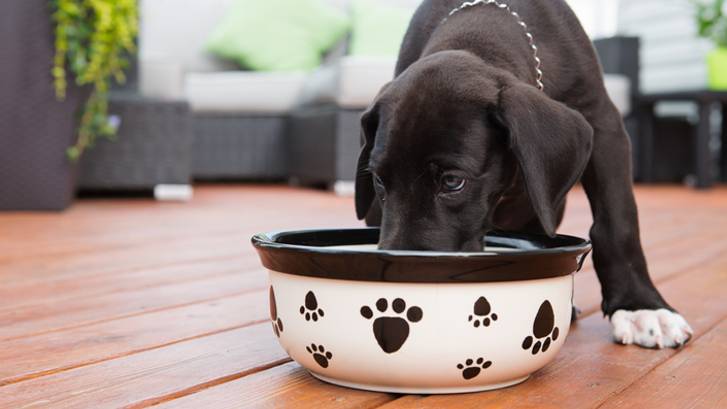
Get the best advice, tips and top tech for your beloved Pets
You are now subscribed
Your newsletter sign-up was successful
If you’ve recently welcomed a new puppy into your life, then you might be questioning when to start feeding puppies wet food. There is lots to learn during this exciting period and we’re here to guide you through and answer any questions you may have.
At three to four weeks, your puppy will come off their mother's milk and move onto a solid food diet (a combination of dry puppy food and water). This looks a little bit like gruel and is soft on their still-developing teeth.
You must feed them the best puppy food (as opposed to the best dog food) because the latter doesn’t contain enough calories to support them during this stage of their development and growth.
Want to learn more about weaning your puppy? Our expert vet Dr. Elizabeth Racine has written a helpful step-by-step guide below. She’s also explained how to choose the best food and whether wet or dry is better.
How to wean a puppy
Weaning puppies begins around three weeks of age. Weaning should always be a gradual process and puppies should never be abruptly taken away from the mother. Instead puppies should be offered a semi-solid food.
Feeding wet food to puppies at this stage is not recommended, because wet food does not contain enough calories to support a young puppy’s rapid rate of growth. Wet food is also very rich and may cause stomach upset in young puppies during weaning.
Create a mush
During the weaning stage, puppies should be fed mush. This can be made by mixing an appropriate dry puppy food with water and allowing it to sit overnight in the refrigerator, forming a soft mush. This mush can then be heated in a microwave (mix thoroughly and check carefully for hot spots!) and offered to the puppies.
Get the best advice, tips and top tech for your beloved Pets
Most puppies will start eating the mush right away, but some may need a day or two to get used to the idea. It’s also important to let the puppies see mom eating solid food during this time, because puppies will often mimic their mother’s behavior.
Provide fresh water
Be sure to also provide a shallow tray of fresh water for the puppies to drink from – and possibly play in! Once the puppies are eating the mush well, you can gradually decrease the water content to make the mush more solid. During this time, the mother should be naturally weaning the puppies by decreasing their access to her milk supply. This, combined with their newfound interest in solid foods, will naturally wean the puppies off of milk and onto puppy food.

When to start feeding puppies wet food
When the puppies are eating solid dry food consistently and are no longer nursing from their mother, wet food can be introduced into their diet. For most puppies, wet food can safely be introduced at around six to eight weeks of age. Wet food may be too rich for some puppies, so introduce only small amounts at first and ensure there is no gastrointestinal upset – such as vomiting, diarrhea, flatulence, or bloating – before you increase the amount of wet food you are offering to the puppies.
Because wet food has a high moisture content, you may notice that the puppies drink slightly less water than they did when they were eating a solely dry food diet. This is normal and is not cause for alarm as long as the puppies remain well-hydrated.
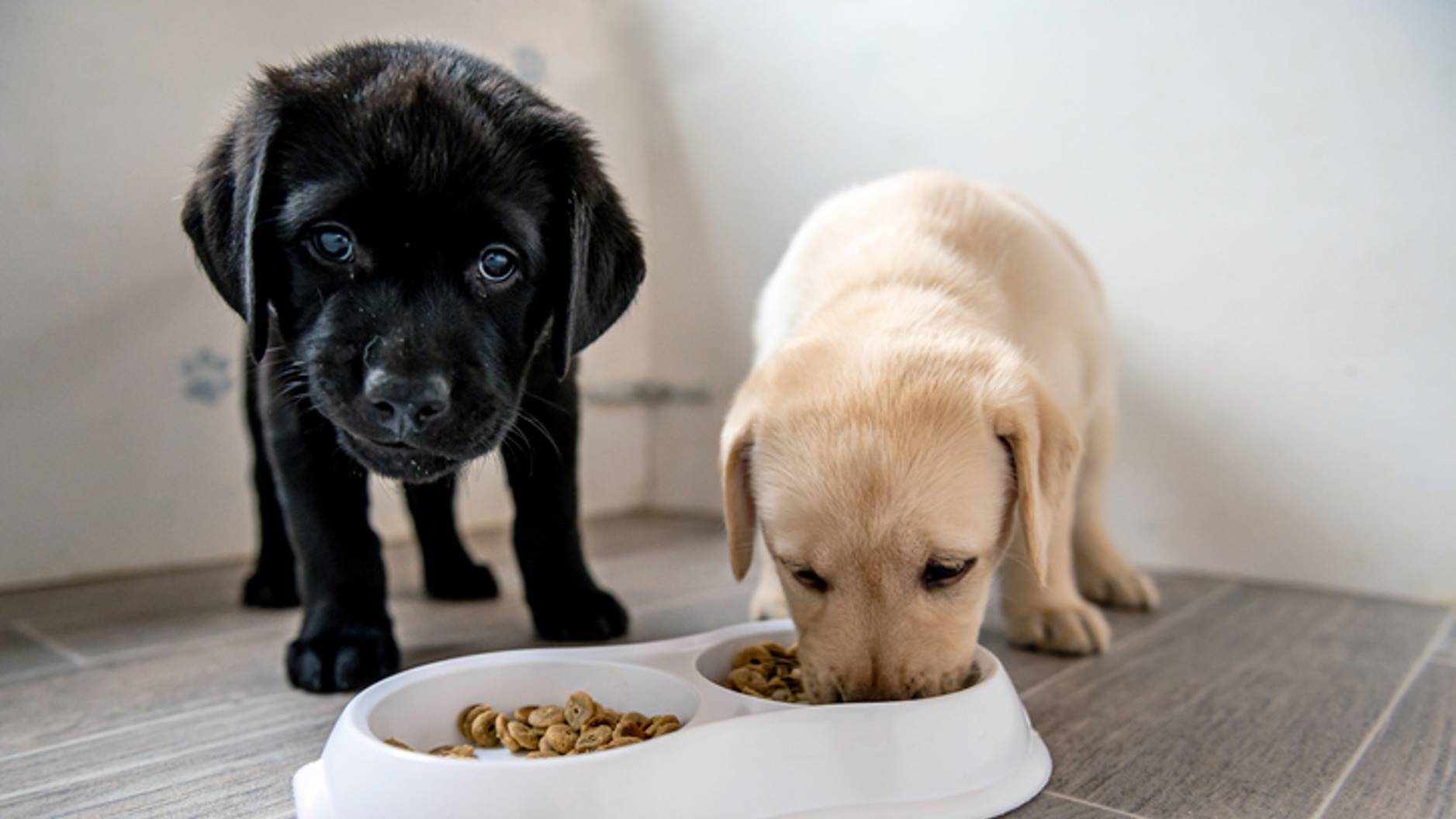
Is wet or dry food better for puppies?
For neonatal puppies, dry food soften with water is better than wet food. This is because wet food has a very high moisture content and a lower calorie content, so the puppies feel full before they’re able to consume enough calories to meet their bodies’ needs.
Because dry food has a higher calorie content than wet food, it is a better choice for puppies during the weaning process. Once the puppies have been weaned and are eating solid food consistently, the choice to feed wet food or dry food is just a matter of preference. As long as the diet you choose is complete and balanced and age-appropriate for your puppy, there’s no significant difference in health benefits between wet food and dry food.
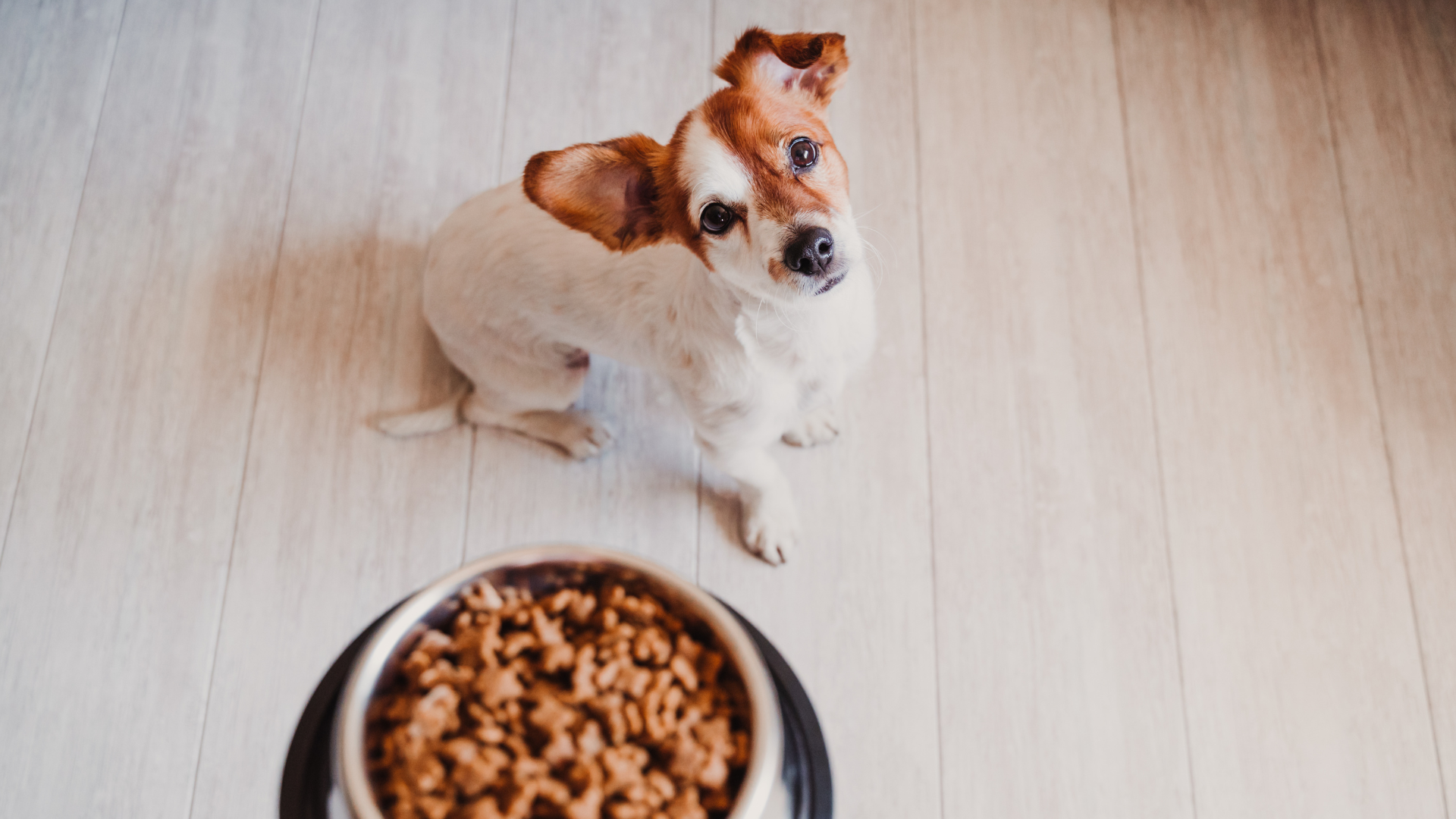
Choosing a wet food for your puppy
If you do decide to feed your puppy wet food, it is important to make sure you choose a product that is healthy and balanced to support your puppy’s growth and development. Check the back of the can for the AAFCO Statement (US) or the Statutory Statement (UK) which should say something like “formulated for growth” or “for growing puppies”. If your puppy is a large or giant breed, choose a wet food specifically formulated for large breed puppies. The statement on the back of the can should say “for the growth of large breed puppies” or similar.
You’ll also want to ensure that the wet food you choose is from a reputable company, which you can do by utilizing the World Small Animal Veterinary Association’s guidelines on selecting pet food or by asking your veterinarian for a product recommendation.
For more information on how to select a pet food, you can learn how to read a pet food label or check out the recommendations from board certified veterinary nutritionists
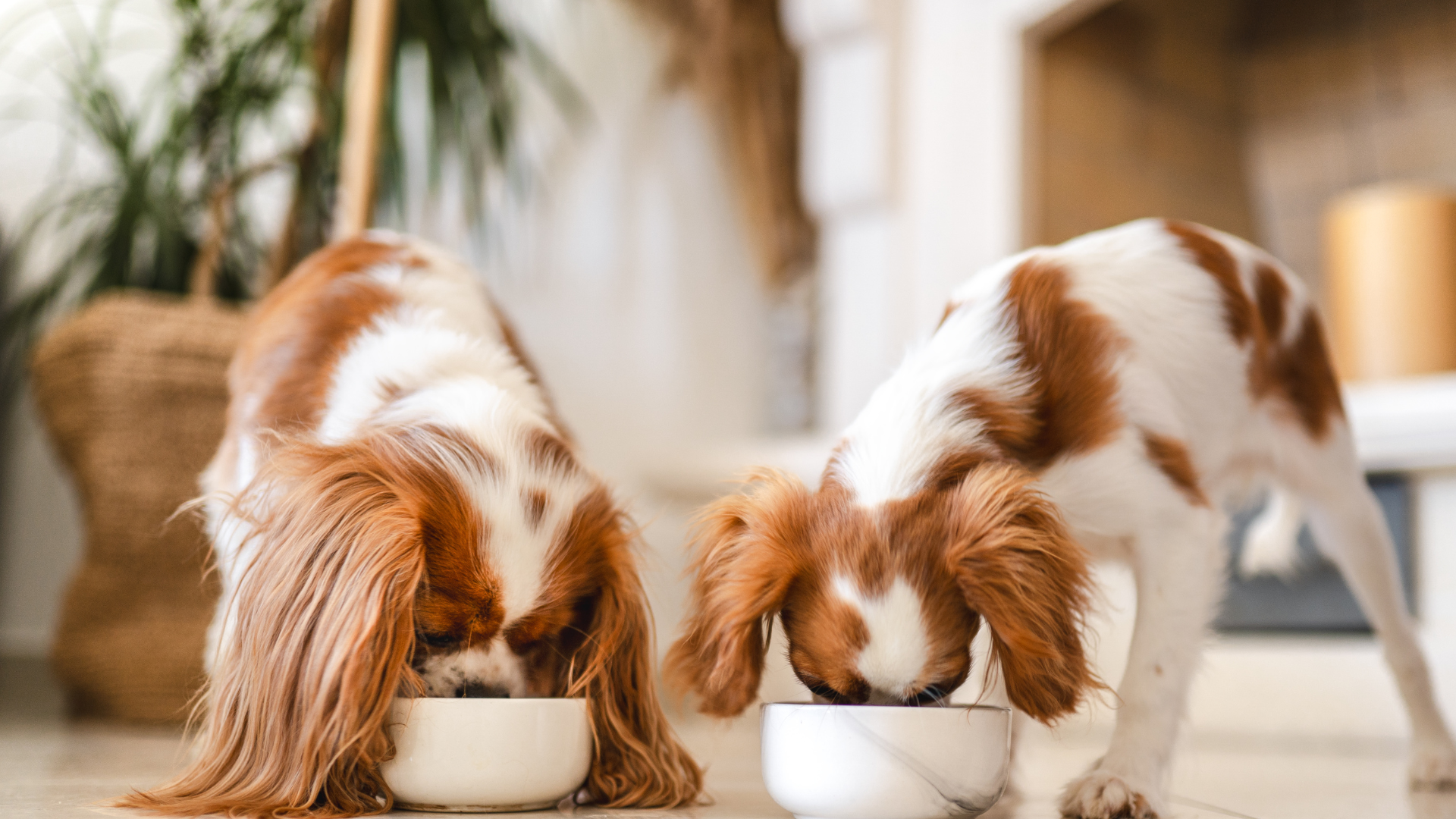
How much to feed your puppy
Pet parents always ask “How much should I feed my puppy?” This is a difficult question to answer, because the right amount to feed your puppy depends on many individual factors such as your puppy’s age, breed, current weight, and body condition, as well as the calorie content of the food you are currently feeding and the number of meals per day your puppy gets.
As you can see, with so many factors involved there’s no answer that works for all puppies! Instead, your veterinarian is your best resource to help you determine how much to feed your puppy to ensure he or she is getting the right amount of calories to support healthy growth and development.
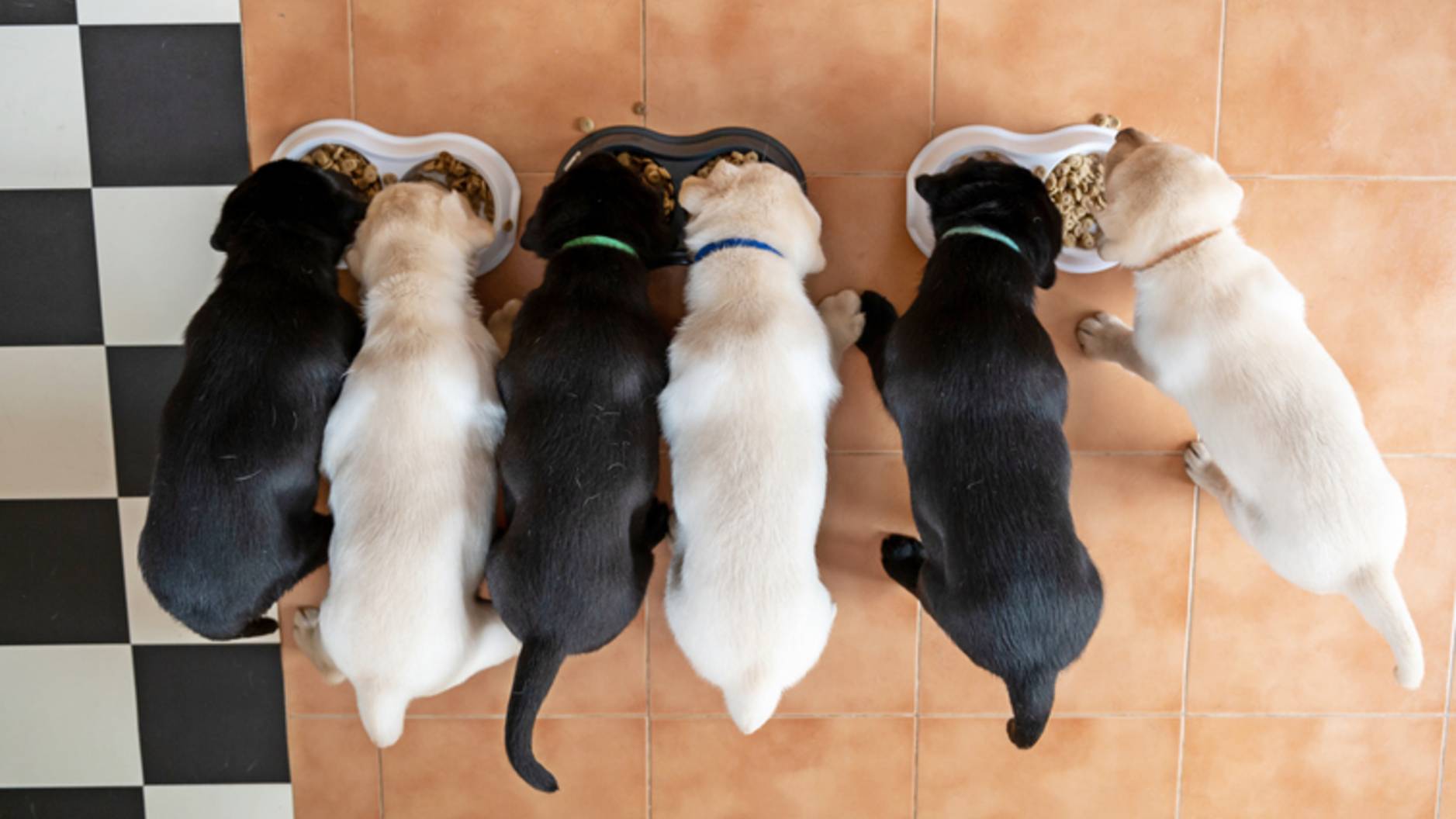
As long as your puppy is fully weaned and eating solid food, it’s okay to introduce some wet food into his or her diet. Just start out with small amounts and watch out for any digestive upset, which can occur with diet changes. If your puppy enjoys wet food and tolerates it well, it’s okay to make this type of food part or all of his or her meal – wet food is just as healthy for dogs and dry food!
Got more questions? Puppy not eating? Noticing puppy aggression? We've got all the answers here for you.

Small animal general practice vet, Dr. Elizabeth Racine, is a specialist in pet health and wellness. She covers everything from veterinary behavior, internal medicine and nutrition. Away from her surgery, Dr. Racine writes for major companies in the industry from the American Kennel Club to Elanco and CareCredit to Bayer PetBasics.
Dr. Elizabeth Racine is a small animal general practice vet covering all things pet health and wellness. Her special interests include veterinary behavior, nutrition, and internal medicine.
As a freelance writer, Dr. Racine has written content for major companies in the industry such as the American Kennel Club, Merck Animal Health, Bayer PetBasics, Elanco, and CareCredit. In her free time, Dr. Racine enjoys playing trampoline dodgeball, hiking with her beagle Dasher, and spending time with her three mischievous cats.
- Megan MilsteadStaff Writer
